Table of Contents
I. Did You Say Humanely Raised, Grass Fed Meat?
II. Our Meat Compared to Grocery Store Meat
I. Did You Say Humanely Raised, Grass Fed Meat?
Here at Moink, we like to call ourselves tender-hearted carnivores. We want to enjoy delicious-tasting protein, but only from an animal that was ethically-sourced, humanely-harvested, and given a life worthy of its sacrifice. Once you hear about, and even more so when you see with your own eyes, the treatment of the animals, the land, and sometimes even the farmers on conventional farms, you’ll swear off meat faster than you can say, “If it’s not grass fed meat, I’ll have the tofu burger please.”
That’s why Moink offers grass fed beef and pork, pasture-raised chicken, and fresh, wild-caught Alaskan salmon from ethical and sustainable family farms. Keep reading to learn more about our ethically-sourced meat, the farmers we support, the truth about most grocery store meat, and the Moink difference.
Our Antibiotic-Free Chicken
Our chickens spend their entire lives on pasture. And that doesn’t mean they get a couple of hours to peck around before heading back into a confinement building. It means they get to free range all day every day. When you receive any Moink box chicken cut, you can feel confident that it’s completely free of antibiotics, growth hormones, GMO grains, solutions, and dyes. Healthy birds raised on healthy land produce the highest quality meat, and that’s why our chicken is tender, juicy and full of flavor.
Say No To Drugged Chicken
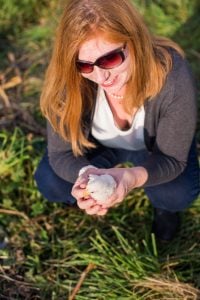
Chicken is a staple in most homes in America, but most of us have noticed the growing controversy surrounding the use of antibiotics in our meat supply, particularly in poultry, over the last few years. There are so many differing (often self-serving) views about whether it’s safe for the big chicken companies to use antibiotics and how much they should have to disclose to us consumers on the label. All the tricky language and greenwashing is downright confusing, but we’re here to shed some light on the topic.
Did you know that around 80 percent of the antibiotics used in the U.S. are fed to animals? It’s because the modern industrial farm is the ultimate breeding ground for disease. Animals are confined in close quarters, often in their own waste, and they stay in a constant state of stress that inhibits their natural defenses and makes them even more susceptible to infection. The animals quickly lose all their beneficial gut flora and grow dependent on the very drugs that are making them sick in the first place. The meat companies keep band-aiding the issue to increase their profits. It’s sad and shameful, but very true.
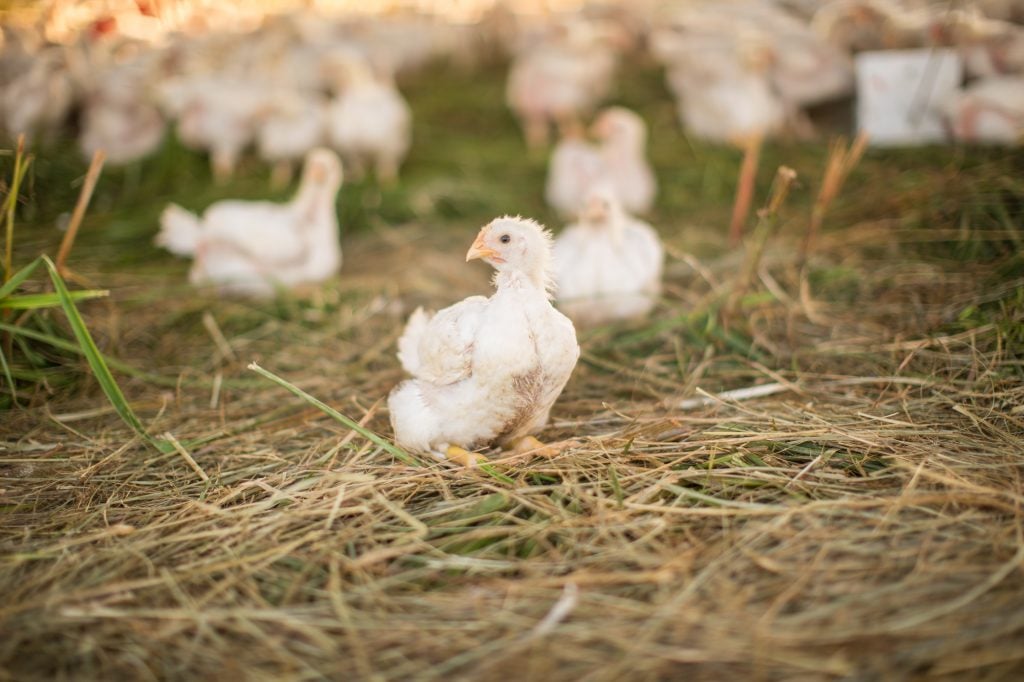
When animals are given antibiotics to treat disease or promote growth, there is undeniable evidence that it also poses a risk to humans. Over time, both animals and people become resistant to the drugs, and that’s why we’re now seeing so many “superbugs,” or illnesses that don’t respond to common antibiotic treatment. This is a major threat to public health. The bugs can breed and mutate in animals and other humans, and then by the time a person catches it the antibiotics won’t work.
When it comes to labeling for antibiotics, meat companies are playing dirty yet again. The USDA says “natural” poultry products cannot contain artificial ingredients like colors and preservatives. But this label doesn’t guarantee anything about how the chickens were raised, what they were fed, if antibiotics and hormones were used, and other practices that a shopper might logically assume from the word “natural.” Terms like “No Antibiotics Ever” or “Not Raised with Antibiotics” don’t necessarily guarantee the chickens weren’t given medications and antimicrobials in their feed and water. Unfortunately, even the term humanely-raised is open to interpretation, depending on who can make a profit.
We’ve said it a hundred times and we’ll keep shouting it from the rooftops: The only way to really know what’s in your food is to know who you’re getting it from.
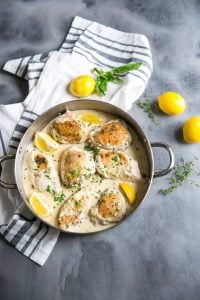
That’s why Moink only works with small family farms who NEVER give antibiotics to their animals. Moink chickens are ethically-sourced and humanely-raised outdoors on pasture like nature intended. We pay regular visits to our partner farms around the country just to be sure they are given a life worthy of their sacrifice! Unlike the big poultry companies, our farmers don’t have to use drugs to compensate for the unsanitary, inhumane way their chickens are being raised. The same goes for Moink beef, lamb, and pork.
Buying store-bought chicken might be the faster, easier, cheaper way, but it’s not the best way, and there is a VERY high cost of cheap food.
Organic, Free-Range Chicken
By this point, many of us are relatively in-the-know on the best treatment of chickens on the farm. At least, we’ve caught on that words like “hormone-free,” “no antibiotics,” and “non-GMO” are a good thing. When the viral movie Food, Inc. came out several years back, many decided it’s worth it to pay a little extra for organic, free-range chicken. More and more people think it’s important that the poultry they feed their family wasn’t kept in massive, inhumane, confinement buildings and pumped with growth hormones and chemical feed, and then drugged to kingdom come to compensate for unsanitary conditions.
But for many people, ethical meat practices stop at the farm. They haven’t put much thought into what happens to chicken once it leaves the farm and goes to the processing facility, so we sat down with Andy Shaw, Director of Operations for Natural State Processing in Clinton, Arkansas. All the poultry from Grass Roots Farmers’ Cooperative, Moink’s main chicken supplier, is processed in Andy’s facility, and our Q&A was eye-opening.
Q: What sets your facility apart from a traditional Big Ag processing plant?
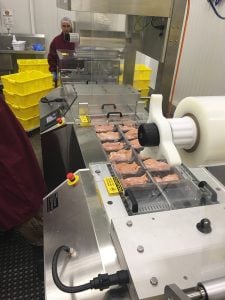
A: It all starts with the quality of chickens that are coming into our facility. They are clean, healthy birds from small family farms. They haven’t been exposed to bacteria from dirty, confined living conditions. Instead of assuming the birds are sick and putting them all through reactive, harsh sanitation procedures, we treat them as if they are healthy and use only proactive, non-invasive measures that add extra layers of protection.
Q: What is your facility’s approach to sanitation?
A: We have a zero-tolerance policy when it comes to any form of product contamination. Our facility uses a system called Mapping, in which we test our products at every stage of the process. If there was ever a suspicion of bacteria, we would be able to identify exactly the point it was introduced and address it directly. Since we are federally inspected, we must prove that our approach is working with lab testing. This often presents a challenge because our birds are so pristine that we can’t even find any bacteria to demonstrate the effectiveness of our anti-microbial practices!
Q: What quality procedures and practices does your facility have in place when processing Moink chicken?
A: Traditional chicken plants soak their birds in a harsh chlorine solution and do other chemical dips to kill off salmonella, campylobacter and other harmful bacteria. While these chemicals are effective in killing off infection, they also change the flavor, texture, and odor of the meat. At our facility, we use an organic hydrogen peroxide and vinegar solution, and our birds are only dipped for 20 seconds. We never use dyes or solutions because we aim to keep the meat as pure and unaltered as possible. We also freeze our products at the height of freshness, so there’s no chance of it sitting out too long, as can happen with many brands of meat. You’ll notice that our chicken has a fresh smell, a nice pink tone, and a really tender texture, and that’s because it hasn’t been bleached, soaked and injected with solutions to make up for its poor quality and bland flavor.
Q: Why does ethical chicken processing matter?
A: Big Food companies take a lot of shortcuts to get meat to the masses as inexpensively as possible. But there’s a high cost to cheap food. Their practices keep the family farmer down, are inhumane to animals and harm the health of consumers. Our team truly understands the value of the meat we are dealing with, and we seek to be good stewards of quality. When animals are given a life worthy of their sacrifice, and then processed with respect and care, everybody wins.
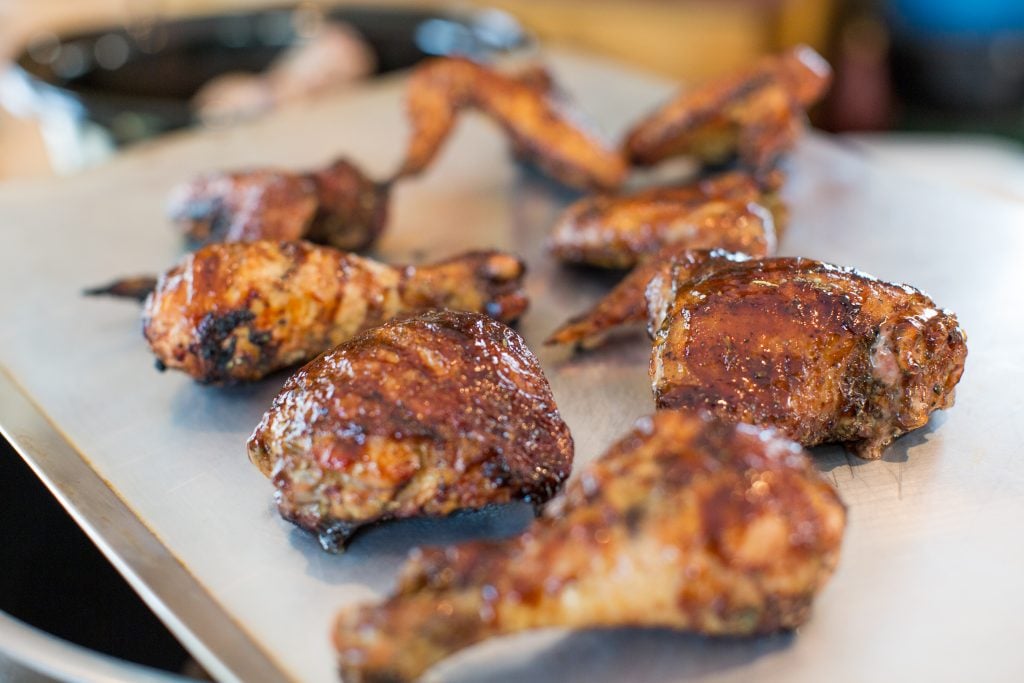
Ready to taste the Moink chicken difference for yourself? You can customize your Moink box with any of the following offerings: Whole Chicken, Boneless, Skinless Chicken Breasts, Chicken Drumsticks, Bone-In Chicken Thighs and Chicken Wings.
Our Grass Fed and Grass Finished Lamb
Moink lamb is grass fed AND grass finished, meaning the animals spend their entire lives on the same farm with the same caretakers. The sheep are raised completely free of antibiotics, dewormers, and GMO feed, and you can taste the difference with every tender bite!
Goats and sheep were designed to eat forage like grass and hay, but when they are sent to a feedlot and given concentrated amounts of corn, soy, and byproducts to speed up growth, it destroys their digestive system and causes metabolic disorders. Between the low-quality feed and all the antibiotics and dewormers they are given to ward off infections and parasites, their immune systems are completely shot. When you buy that store-bought rack of lamb, there’s a strong chance that meat has been infected with disease and drugged to high heaven.
What’s Worming Its Way Into Our Meat?
Sheep are like premature babies, frail and in need of constant care and protection. They’re extremely susceptible to some pretty rough disease like pneumonia, hoof rot, and parasites, and most sheep farmers are pumping their flock with high doses of antibiotics and harsh dewormers like Ivermectin just to keep them going. The problem is that now, mutated “superbugs” and “superworms” have developed, and all those drugs are becoming less and less effective.
When you buy lamb from the grocery store, there is a very high chance that meat is infected with a bacteria or parasites. It brings a whole new meaning to that old camp song, “Guess I’ll Go Eat Worms,” huh? If the store-bought lamb is free from disease, it’s only because it’s been drugged to kingdom come.
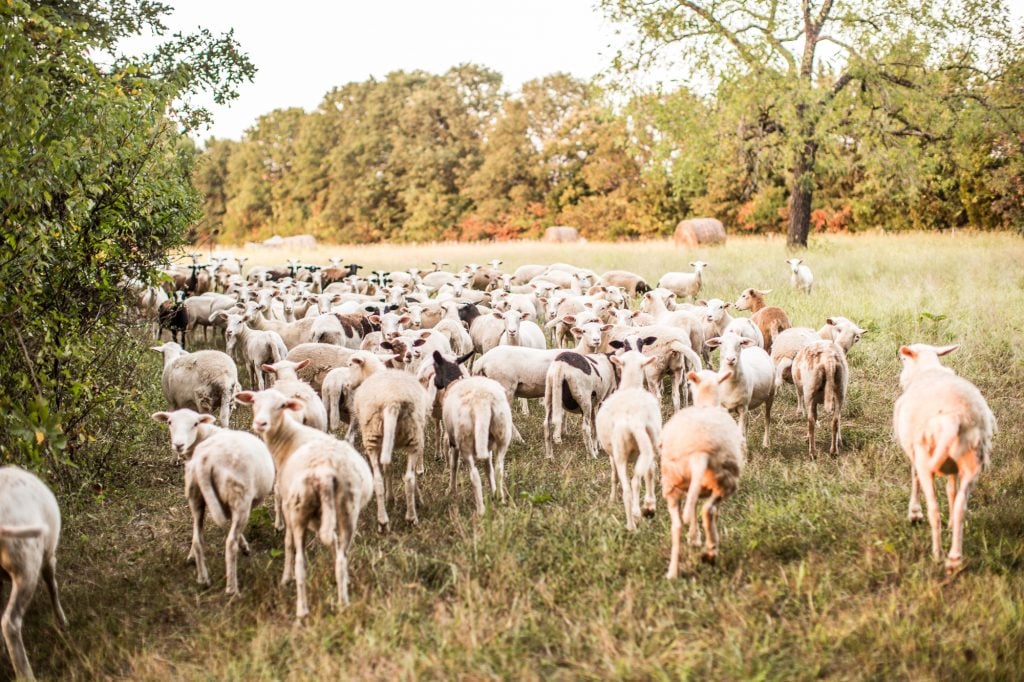
Since meat companies aren’t required to disclose anything about animals’ health history and the use of dewormers on their labels, shoppers like us have no way of telling if that lamb chop we’re bringing home for our family is truly healthy. Even many of the big “organic” and “free-range” farms are playing the political loopholes, and their animals are oftentimes treated just as unnaturally and inhumanely as the conventional factory farms.
Raising Healthy Sheep
Raising healthy sheep truly is an art form, so Moink doesn’t trust just anyone. Our primary lamb supplier, Brad Ingram, sets the bar for what we look for in our partners. Brad gives his sheep around-the-clock care, constantly rotating them to fresh pasture where the grass is high enough to keep worms away. Sayonara, creepy crawlers! On Brad’s farm, there are no confinement buildings, no processed feed (just lush grass and hay!), and no worm drama.
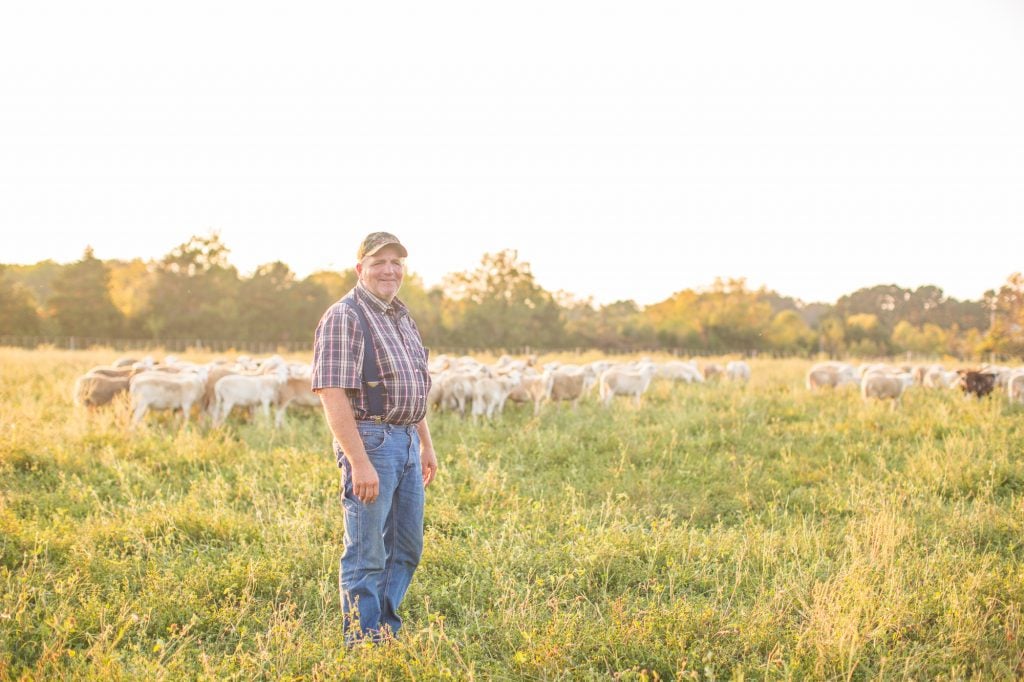
Brad doesn’t have to pump his sheep with antibiotics and dewormers, because the excellent care they receive means they aren’t put in a situation to need them. An ounce of prevention is worth a pound of cure! He’s perfected the breeding process, resulting in the highest possible quality of lamb meat – 100% pasture-raised, 100% grass fed meat, 100% tender and delicious!
You can customize your Moink box with any of the following lamb offerings: Ground Lamb, Leg of Lamb Steak, Lamb Chops and Lamb Kabobs.
Our Beef
If you’re striving to eat a clean and healthy diet, switching to grass fed, grass-finished beef is a great place to start. Raised on pasture from start to finish, Moink beef is ethically-sourced, humanely-raised and tastes so tender and delicious.
Grass Fed Meat, Through and Through
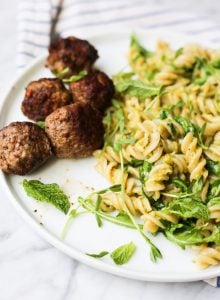
Here at Moink, we believe that with great meat comes great responsibility, and that’s why we love paying personal visits to the farmers that feed you and celebrating their ethical and sustainable practices. It’s a true privilege to meet with and share the stories of these hardworking folks, who put so much thought and effort into the care of their land and animals.
After all these field trips, we’ve learned a thing or two about what goes into raising healthy and happy cattle, and we want to let you in on a little-known secret: All beef starts out grass fed. That’s right, all cattle spend the majority of their first year of life grazing on grass like nature intended. For this reason, the term grass fed meat is now open to interpretation and is quickly becoming just another marketing claim that the big food companies are twisting to their advantage.
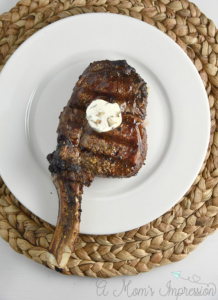
But when it comes to premium beef, it’s what happens during their last several months of life that matters the most. It’s not the start, but rather the finish, that makes all the difference in the world when it comes to the humane treatment of the cattle and the quality of the meat. So, when deciphering labels make sure you ask about grass-finished and confirm that your meat was never given grains.
Grass-Finished Beef – A Cut Above
Moink only works with beef suppliers like The Mannix Family in Montana, whose cattle spend their entire lives in the pasture, and not the confinement building. We rest easier knowing that Moink cattle live healthier, happier lives.
Good meat comes from healthy land. That’s why another requirement of a Moink farmer is being a good steward of the environment. Our partners view themselves as managers, rather than owners, of the land, sea, and animals. They care for the whole ecosystem so it can flourish for generations to come.
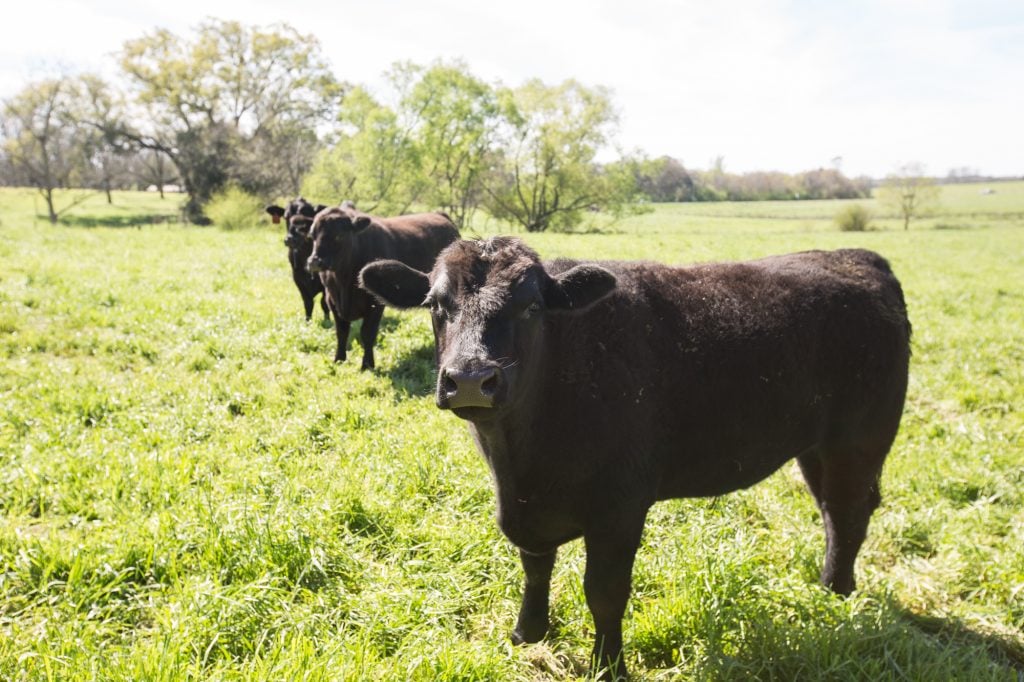
You can also feel all warm and fuzzy about the nutritional benefits of grass-finished beef. It has less total fat and more heart-healthy Omega-3 Fatty Acids and Conjugated Linoleic Acid. With more antioxidants like Vitamin E, grass fed meat has anti-cancer and anti-diabetes properties.
The most tender and delicious ethically-sourced, humanely-raised grass fed beef is just a click away. You can customize your Moink box with the following beef offerings: Ground Beef, Flat Iron Steak, French Ribeye Steak, Petite Sirloin Steak, Filet Mignon, Flank Steak, Bone-In Short Ribs, Beef Tenderloin Kabobs, Beef Liver, and Beef Marrow Bones.
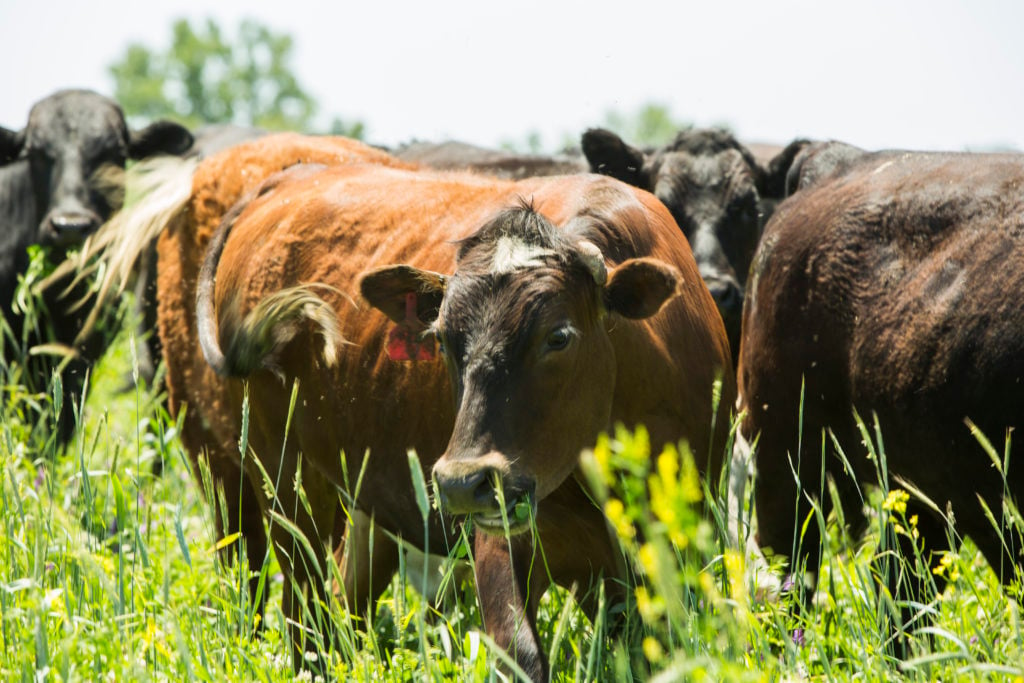
Our Salmon
Buying high-quality fish can be complicated. We’re told that fish is rich in heart-healthy Omega-3s, B vitamins, and antioxidants, and we should be incorporating the low-calorie protein into our diet a couple times a week. But then we’re also hearing more and more about all the unethical and unhealthy fish farming practices, and toxic chemicals and metals found in store-bought fish. It’s hard to tell if the health benefits of the country’s second popular seafood item outweigh all the risks.
Fishy Farming Practices
The majority of the salmon available in the U.S. is farm-raised, which means the fish are kept in captivity in cages or nets until they’re harvested. Whenever any animal is kept in crowded conditions, contamination and disease become an issue, so vaccines and antibiotics are given to control infections. Dangerous levels of carcinogenic polychlorinated biphenyls, or PCBs, build up in the fatty tissue of the fish from water pollution and the ground up fish they’re fed. Farmed salmon has also been found to contain toxins like methylmercury and dioxins, and farms have even been accused of fostering disease, polluting our oceans and spreading sea lice (gross!).
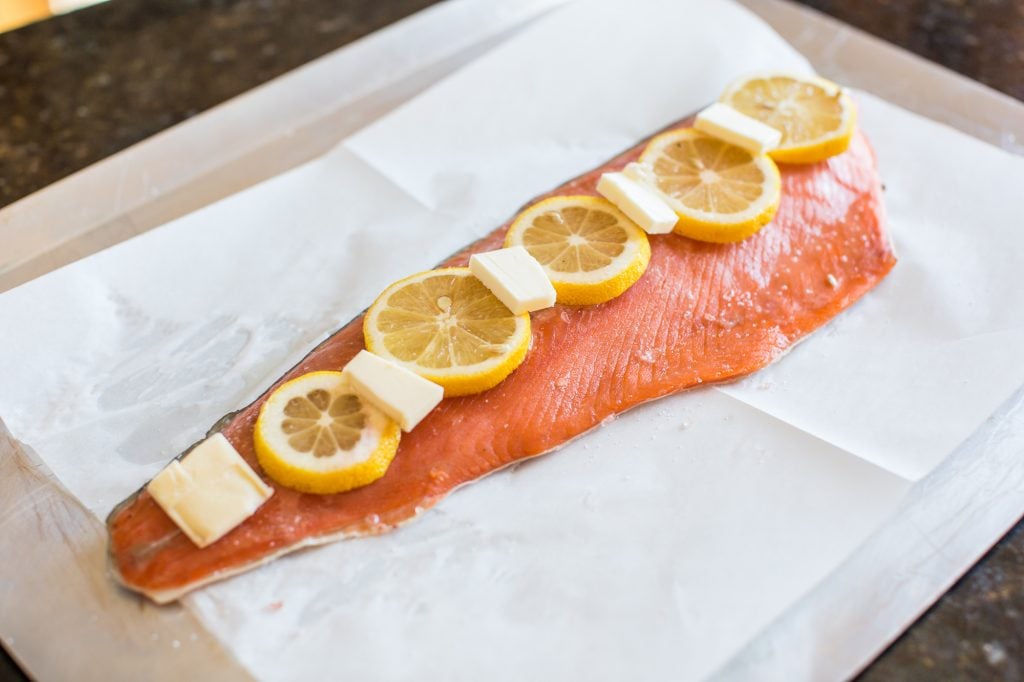
Another not-so-fun fact is that farm-raised salmon are naturally white since they’re unable to feed on crustaceans from their environment like nature intended. Farms deal with this by giving the salmon a chemical feed that changes the color of their flesh to that pretty reddish-pink color. Grocery store shoppers have no ideas that the brightly-colored salmon they’re bringing home to nourish their family is actually harmful. It’s just so wrong!
Go Straight To A Trusted Source
While farming practices are improving to become more sustainable in recent years, there’s a lot of shady politics and loopholes involved in the regulation process (shocker!). Once again, the only way to really feel confident about the quality of your food is to know who stands behind it.
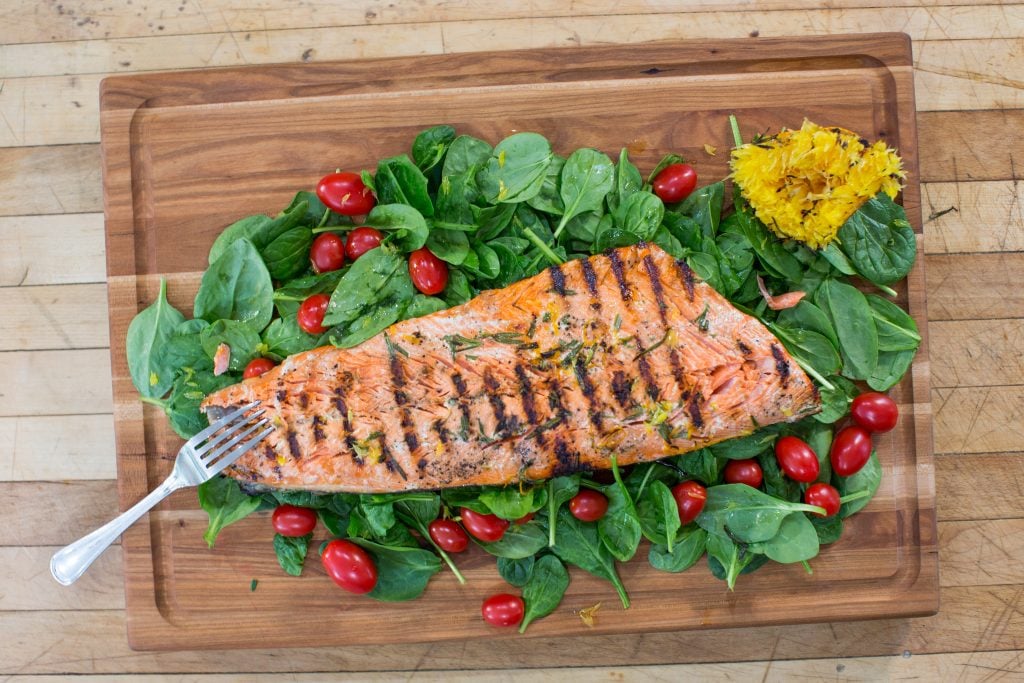
That’s why Moink skips the big fish farm middleman and works directly with the fisherman. We partner with Captain Tony Wood of Wild Alaska Salmon & Seafood Company, who harvests fresh, wild sockeye salmon straight from the crystal-clear waters of Bristol Bay, Alaska. His fish is caught, processed and delivered right to your doorstep while it’s still at peak freshness and flavor. No confinement, processed feed or shady coloring necessary! We love that Tony and his wife Heather share our mission for ethically-raised meat, and are dedicated to the care and protection of the Alaskan wilderness.
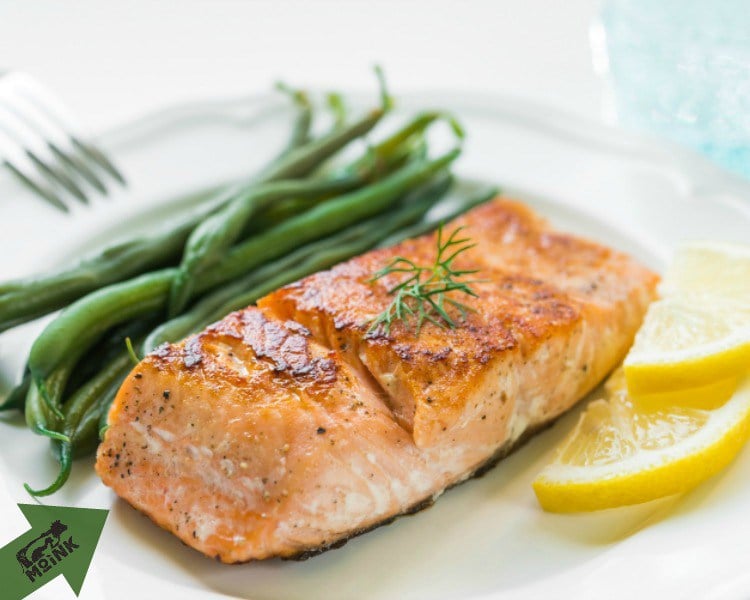
Walk on the Wild Side
Finding the most flavorful, responsibly-sourced, wild Alaskan salmon doesn’t have to be complicated! You can have it delivered right to your door! You can customize your Moink box with three different salmon offerings: Small Salmon Filet, Large Salmon Filet and Ground Salmon.
Our Pork
Moink pork is raised outdoors on pasture, just like nature intended. The majority of Moink animals are “farrow to finish,” meaning they spend their entire lives on the same farm with the same caretakers. We put great care into making sure our pork is humanely harvested, preferably on a farm or with artisan processors. When you enjoy Moink pork products, you can feel good knowing that it hasn’t been pumped with hormones, antibiotics, MSG, nitrates, added sugars, dyes or other funk, and the hogs were given a life worthy of their sacrifice (that means no confinement buildings or feedlots, ever!).
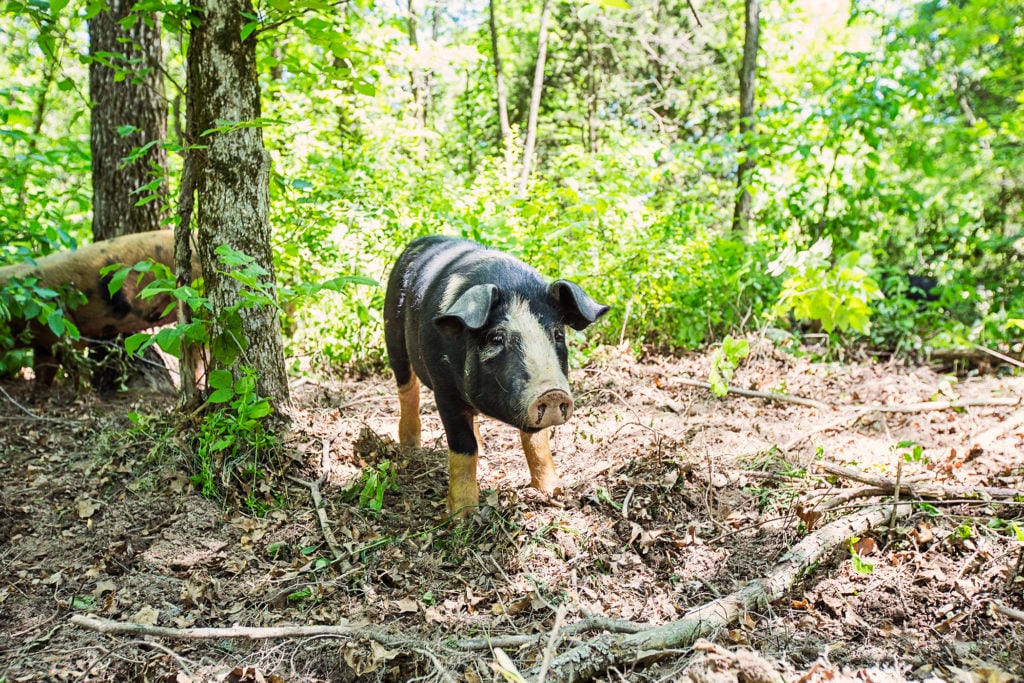
Pork Should Be Pure
At Moink, we believe in eating real food. That’s why our bacon has only two ingredients: pork and salt. Why does it have such amazing flavor? Well, it starts with the kind of hogs we raise – a heritage breed. Then, we raise them on pasture where a pig is free to be a pig. And we smoke our bacon with REAL smoke. Our bacon has no nitrites or nitrates (naturally occurring or otherwise) or sugar. Just bacon done right.
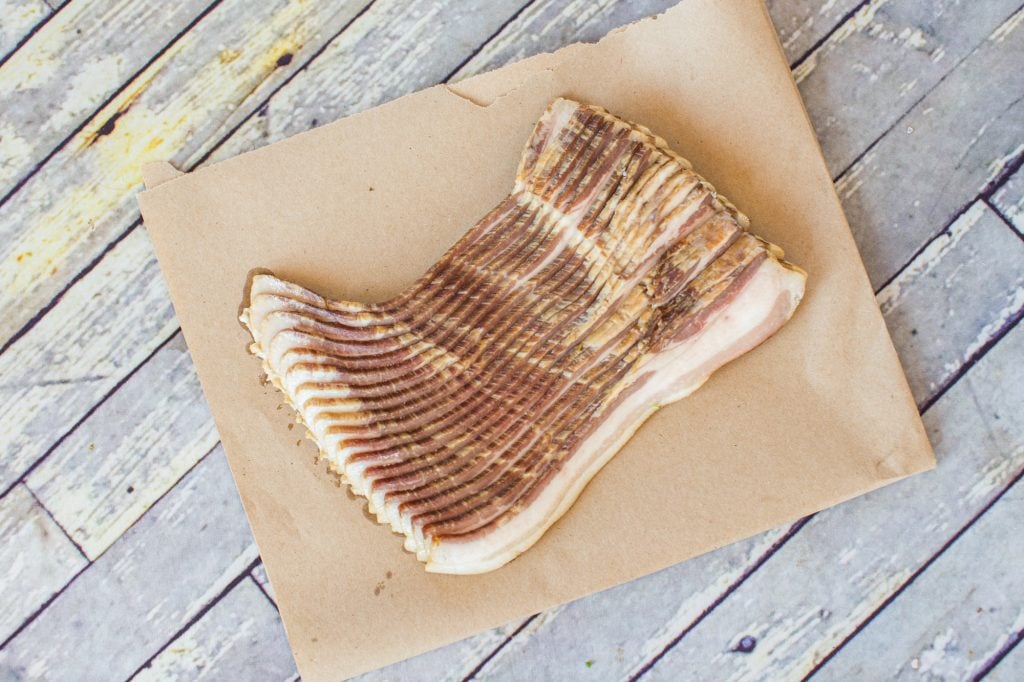
Have you ever checked out all the ingredients added to store-bought pork products? It’s pretty mind-blowing to see all the artificial flavors, hydrogenated oils and other just plain weird as well as potentially harmful ingredients. If you look up some of the most popular brands of breakfast sausage, you’ll find many of their products contain more than 15 ingredients! They use all those additives because the pork is produced in a way that doesn’t yield a good flavor. But Moink pork sausage? It’s just pork, salt, red pepper, black pepper and rubbed sage. End of story. Simple and flavorful.
Once you try Moink pork, you just can’t go back to salty, additive-laced store-bought products. You can customize your Moink box with four pork offerings: Bacon, Breakfast Sausage, Pork Chops and Pork Shoulder.
II. Our Meat Compared to Grocery Store Meat
Sometimes, the healthiest food option is obvious, but when it comes to buying meat, the average shopper is often completely oblivious or misinformed about the best choice, or they don’t know where to find it. Others are highly educated but feel totally overwhelmed by all the disturbing information and what they can actually do about it.
One of our core values is shedding light on the sketchy practices Big Ag and corporate conglomerates like to employ to confuse consumers. The waters are murky out there when it comes to what’s what in the grocery store, and if we are going to clear them up, we have to start by understanding what is even happening.
Chicken Solution: Shedding Light On All That Salt
Ever notice that fine print statement about “solution” on store-bought (and some delivery company’s) chicken? In case you didn’t have your magnifying glass, it usually reads something like, “enhanced with up to 17% of a seasoned solution,” or “contains up to 7% of a solution of water, salt, and spices to enhance tenderness and juiciness.”
The word solution may seem pretty harmless compared to the hormones, antibiotics, and GMOs that are already on our radar. But it still makes us wonder, what’s the deal with these so-called enhancements, and who’s keeping tabs on them anyway?

It turns out the nation’s largest meat companies are pulling another fast one on consumers. During the process of enhancing, or plumping, meat is injected with water, salt and additives (chicken solution) to help preserve taste and moisture. It sounds gross, but it’s the industry standard. What exactly are these additives? Nobody really knows! That’s because the practice isn’t closely regulated, and companies aren’t required to disclose the exact ingredients and quantities of the solutions they’re using.
And what about all the fine folks trying to watch their sodium intake? According to the Truthful Labeling Coalition, enhanced chicken can contain more than 800% more sodium, with 25% of an adult’s daily sodium allowance in a single serving. The average shopper has no idea they’re pounding all that salt, and that’s before they add more seasonings at home.
So not only are you getting who knows what in your chicken- you are also unknowingly paying for saltwater and fillers, $2 billion a year to be exact! And some chicken companies label their product as all-natural or even organic, although it contains a very unnatural amount of sodium, and who knows what additives, in every bite. Goes to show you that a label is only as good as the person who stands behind it.
It seems to us that the only thing really getting enhanced here is the big meat companies’ profits. Here at Moink, we’re committed to keeping all of our meat free of any solutions, because we’re confident the flavor and tenderness of our meat can stand on its own.
Looks Can Be Deceiving: Say Bye To Dyes
Let’s talk the dirty details on the altered color of many supermarket meat products. Just like people, meat comes in all shapes, sizes, and colors. So why is it that when you visit the grocery store meat aisle or counter, every single package of meat is uniformly bright red? If they’re being honest, a farmer, butcher or even the grocery store meat manager will tell you this simply isn’t natural.
Once meat is exposed to air, it gradually turns from red to a not-so-festive brown or grey color. For all of you science nerds, this process is called oxidation. While grocery stores put new meat out each day, some packages sit on the shelves for many days. To keep the meat looking appetizing, they treat it with Carbon Monoxide. That’s right, the gas that is emitted from car exhaust pipes, lawn mowers, and charcoal grills. Although this Carbon Monoxide is tasteless and odorless, it’s highly poisonous, and even minor inhalation can lead to symptoms like fatigue and headaches. But it’s okay to put it in our food?
It’s estimated that as much as 70 percent of supermarket meat has been treated with Carbon Monoxide, which keeps it looking artificially fresh, even if it’s spoiled, for up to a full year! We don’t know about you, but the idea of meat being altered to look like it’s one day old when it’s actually been sitting in a display case under fluorescent lights for days on end, well that is just weird.
It’s not just the bright red beef case you need to be wary of when doing your grocery shopping. Some companies use a combo of Blue 1, Yellow 5, Yellow 6 and Red 40 dyes to keep their salmon filets looking bright pink. Farm-raised salmon can be naturally white, so they’re given a chemical feed to alter the color of their flesh to the same bright pink hue of wild-caught salmon. Store-bought pork products like bacon and ham are treated with a chemical called Sodium Nitrite to change the colors.
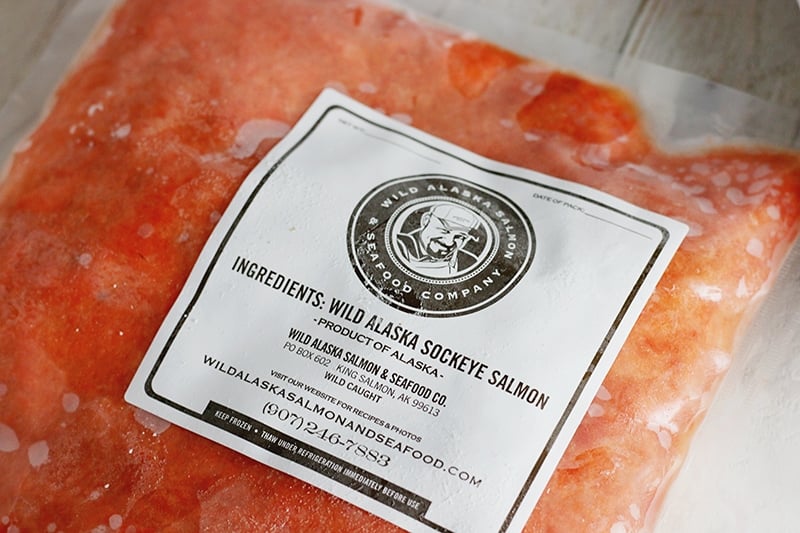
Many of these ingredients are outlawed in Japan, Canada, and the European countries, but the U.S. Food & Drug Association still lets them fly. The big meat companies claim these shady coloring practices are harmless, and necessary to keep meat affordable and to prevent waste. They also say we can look for other signs that are meat has spoiled, like a bad odor, slime or bulging packaging.
At Moink, our meats are NEVER doctored to alter color. What you see is what you get!
The MSG Catastrophe
Let’s talk pork and Monosodium Glutamate (MSG), one of the worst of the food additives. MSG is salt of the amino acid, Glutamic Acid, and is used as a flavor enhancer in most bottled, bagged, frozen or canned processed food on supermarket shelves. Since it’s often a component of another ingredient, food companies can label it discreetly. They’ll even use misleading language like “no added MSG” to hide its presence. The FDA only requires manufacturers to put it on the ingredient label if it’s a 99% pure MSG. They also set zero limits on how much of this poisonous substance can be added to our everyday foods, claiming it’s safe in any amount.
But once you start looking for MSG by all of its sneaky names (there are dozens!), you see that it’s in so many store-bought meats, including meats like bacon, lunch meat, hot dogs, sausage and even salmon. (Who knew the grocery store could be such a scary place, huh?)
MSG is proven to make food more addictive. It tricks the brain into releasing insulin and creating an insatiable appetite (That’s why we can’t put those snack foods down!). Food processors and fast food restaurants have studied this more than anyone, and they purposely engineer their food to keep you coming back for more and eating way more than your body needs!
MSG is a TOXIC substance, causing health problems like headaches, diabetes, seizures, high blood pressure, excessive weight gain, and stroke, just to name a few. Since its introduction into the U.S. food system, Type II Diabetes and childhood obesity have skyrocketed. In fact, scientists inject MSG into lab animals to induce obesity so that pharmaceutical companies can test their drugs on them!
It’s more important than ever that we find food companies we can trust. Look for manufacturers and retailers who are transparent about what goes into their food. Ask the hard questions and see if they’ll give you a straight answer. MSG is never added to Moink Meat. Once again, the flavor of our products stands on its own.
III. The Moink Difference
But we want to do more than just deliver delicious meat to your doorstep. We want to educate you on what’s really happening with our food system and empower you to stand with us in our mission to change it!
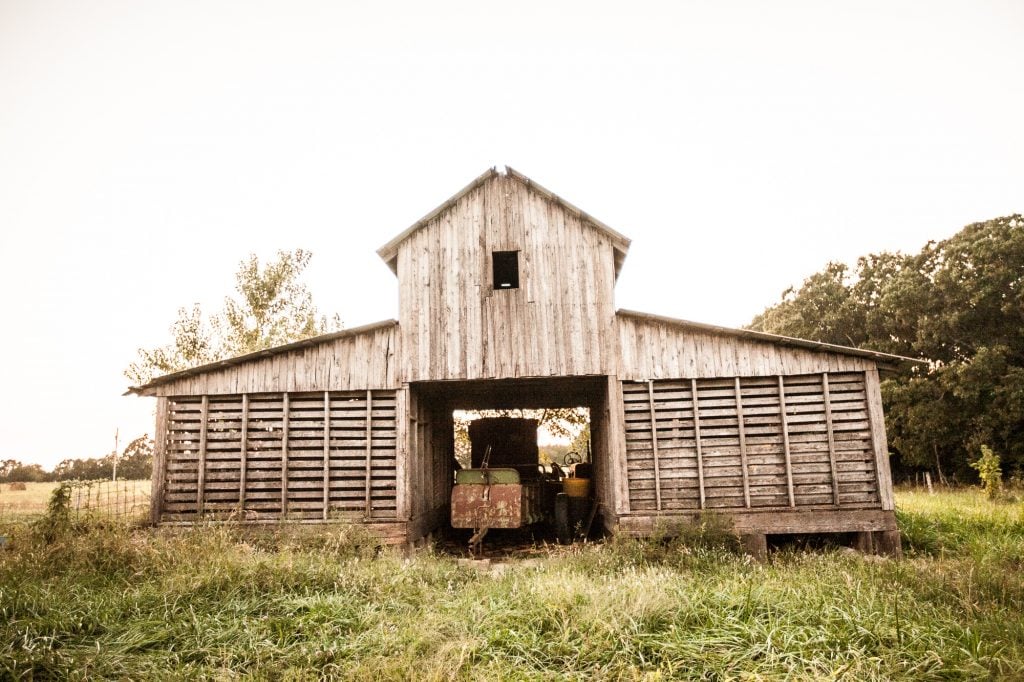
We Stand Up For Farmers
Moink passionately supports the family farmers, the ones just trying to make an honest living without sacrificing their land and their legacy.
Today’s family farmers face major hurdles when it comes to harvesting their animals. Current law prohibits states from setting their own inspection rules, and any meat processed via custom slaughter (aka with artisan processors in independent facilities) can’t be sold commercially. There aren’t many USDA-approved facilities, and it isn’t cheap to do business with them.
Small farms have to go the same route as their bigger competition. This system keeps the family farmer down, and Big Agriculture on top (That’s why four companies control 80 percent of the American meat supply!). This also means many farmers work so hard to raise their animals in a humane and compassionate way, only to be forced to send them off for a traumatic and inhumane end. The long trip to the slaughterhouse is stressful on livestock, and it affects the quality of the meat. Everyone loses.
No farmer sets out to harm animals and the environment. They’re just trying to support their families and hold on to their land, and they think they don’t have a choice. But there is a better way! Moink makes it possible for farmers to operate on their own terms. We give them a guaranteed market at a better price than the big food companies so they can focus on quality over quantity.
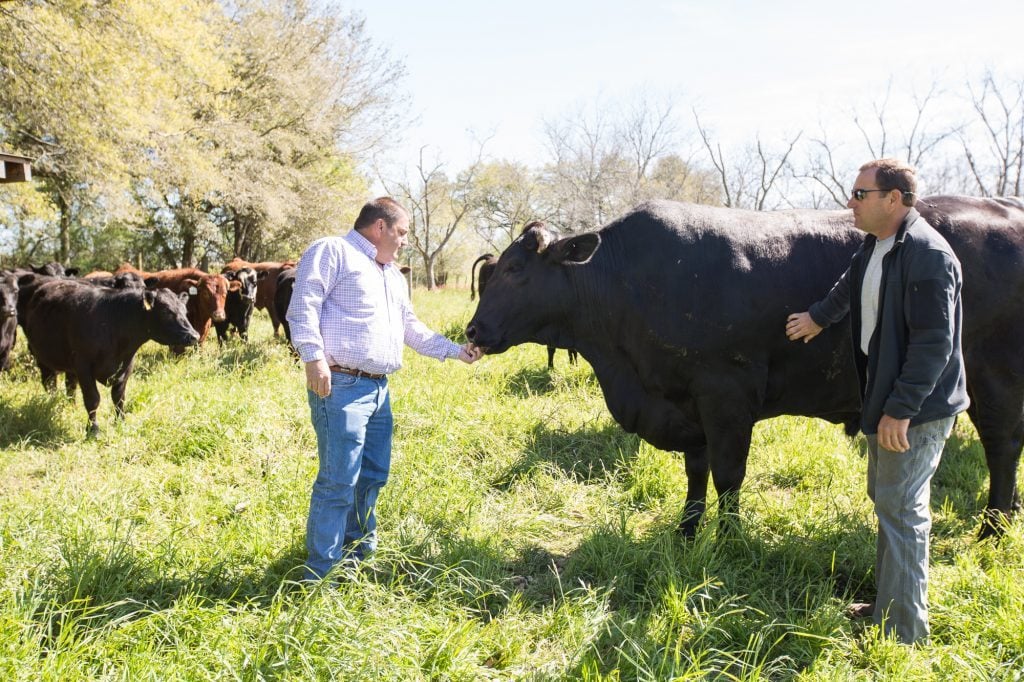
Finding delicious proteins grown in a sustainable, humane way shouldn’t be a game of “Where’s Waldo.” Connecting ethically-conscious meat lovers to humanely-raised meats from small family farms should be simple, and at Moink we are working to make it so. We only partner with family farms with small flocks. Our farmers are completely transparent about their operations, so we don’t need to use a bunch of shady and misleading language on our packaging. It’s like your grandma said, “Good meat makes its own gravy!”
Moink partners with more than 100 of the best family farmers around to bring you the highest-quality meat money can buy. We’re dedicated to supporting these often unappreciated, but so very important, hardworking men and women, and shining a light on what’s really going down with our food system. While only 2 percent of Americans are farmers, 100 percent of us gotta eat. Our mission matters, to all of us and our children!
We Care For the Land
Sustainability matters. When we talk about ethical meat and being tender-hearted carnivores, we’re not just talking about how we treat animals, but also how we treat the land, water, and soil.
When we hear about the meat industry’s role in deforestation and global warming, it breaks our hearts and fuels our mission. Just recently, there were reports about the largest dead zone on record in the Gulf of Mexico. Due to toxins from livestock manure flowing into our waterways, huge marine life populations are being killed off. Much of this large-scale water pollution and depletion of our natural resources is being fueled by big food companies that will line their pockets with profit at any expense, including the expense of family farmers.
Large food companies that have backed small farmers into a corner. Their actions are irresponsible, unkind and downright shameful. When we hear about this poor treatment of our planet, we can get fired up and then do nothing, or we can try to make a difference, even if it’s small. Like Gandhi said, we must “be the change we want to see in the world.” For the sake of our babies and grandbabies, it’s time to start walking the walk instead of just talking the talk.
It used to be hard for small family farms to get their sustainably-raised meats into the hands of tender-hearted carnivores. Moink was designed to create the marketplace for other like-minded farmers to sell their high-quality proteins. Caring for the land is a huge part of our vision and values because we farmers know first hand the harmful effects unethical practices can have on our land, our water, and our community.
Moink Farmers Lead The Way
It’s not always convenient, and certainly not as profitable, but Moink’s family farmers are doing what they can to raise quality animals and still be good stewards of the land. Our partners Cody and Andrea Todt of Falling Sky Farms in North Central Arkansas have worked tirelessly to create a symbiotic relationship between their pasture-raised chickens, forest-raised pigs and grass fed cows and the land they manage. Cody explained:
“We’re passionate about our animals staying on the move.” While industrial farming practices damage the environment by allowing toxic levels of nitrogen from manure to build up in the soil, we regularly move our animals to a new pasture to keep them healthier and to allow the land to have plenty of time to rest and recover.”
Another responsible farm we’re proud to support is Mannix Family Ranch, located in Helmville, Montana, the heart of the rich and breathtaking Blackfoot Valley. Fifth-generation farmer David Mannix and his brothers attribute much of their grass fed beef’s taste and tenderness to the healthy land on which it’s raised and finished. The Ranch has always operated under the belief that the family themselves aren’t the owners of the land and livestock, but rather humble managers. The Mannix Brothers are constantly honing their practices so they can pass on the value of stewardship and conservation to the next generation, just as it was passed to them.
“We strive to be worthy caretakers of all the resources we manage,” said David. We care for the whole ecosystem in such a way that it can flourish. Our goal is to provide for our families, deliver the best beef to our customers, and contribute to the long-term health of our community and environment.”
And then there’s our favorite fisherman, Tony Wood of Wild Alaska Salmon & Seafood Company. The majority of the salmon available in the U.S. is farm-raised, meaning the fish are kept in crowded and contaminated cages until harvest time. Large amounts of antibiotics and vaccines are used to control infections, and then dangerous levels of carcinogenic polychlorinated biphenyls, or PCBs, build up in the fatty tissue of the fish from water pollution and the ground up fish they’re fed. Farmed salmon has also been found to contain toxins like methylmercury and dioxins, and farms have even been accused of fostering disease, polluting our oceans and spreading sea lice!
As Tony and his wife Heather learned more about unethical fish farming practices in our country, they decided to find a better way to get fish straight from the crystal-clear waters of Bristol Bay, Alaska. For the last 18 years, the husband-wife team has been bringing pure delicious fish from sea to plate while it’s still at peak freshness. Tony and Heather have proven it’s possible to harvest the most premium wild salmon in the world and still carry out their mission to protect the Alaskan wilderness.
Conventional farming practices wreak havoc on our planet. While big food companies are willing to reap a plentiful harvest today at the expense of tomorrow, at Moink we want to be good stewards of our environment. Moink has a network of about a hundred eco-friendly farms all over the U.S. and beyond, and we’re working hard to support their operations and tell their stories.
Together, we can fix our broken food system and make a difference for future generations, all while enjoying the most delicious meat money can buy. Every time you skip the shady grocery store meat and order a Moink box instead, you send a message and place your vote for the fair treatment of farmers, the humane treatment of animals, the ethical treatment of our land.
Order Your Moink Box Today!
Get the Meat YOU want on YOUR Schedule:
- Our boxes are fully customizable. Start off with any of our four box types, and swap out the cuts you do not want for the ones you do.
- We ship to the lower 48 states. SHIPPING IS ALWAYS FREE!
- Each box has 13-16 lbs of meat which works out to less than $4.50 serving.
At Moink, we believe you deserve to know exactly what’s in your food and where it’s coming from. And call us crazy, but we don’t think you should have to spend your hard-earned money on harmful ingredients like salty additive water, dyes, antibiotics, hormones and MSG. You should be able to eat real food and support family farmers who treat animals humanely and are good stewards of our land.
Are you ready to have exceptional-tasting Moink products delivered straight to your door, or do you need one more reason to make the switch to ethical meat? It just tastes BETTER! When animals are able to live and flourish in a natural environment and eat the way nature intended, meat tastes like it’s supposed to taste (It’s not rocket science, people!). Moink beef, lamb, chicken, and salmon is lean, tender and downright delicious! Order a Moink Box today.
Ready to join the Moink Moovement and help us fight for the family farm?
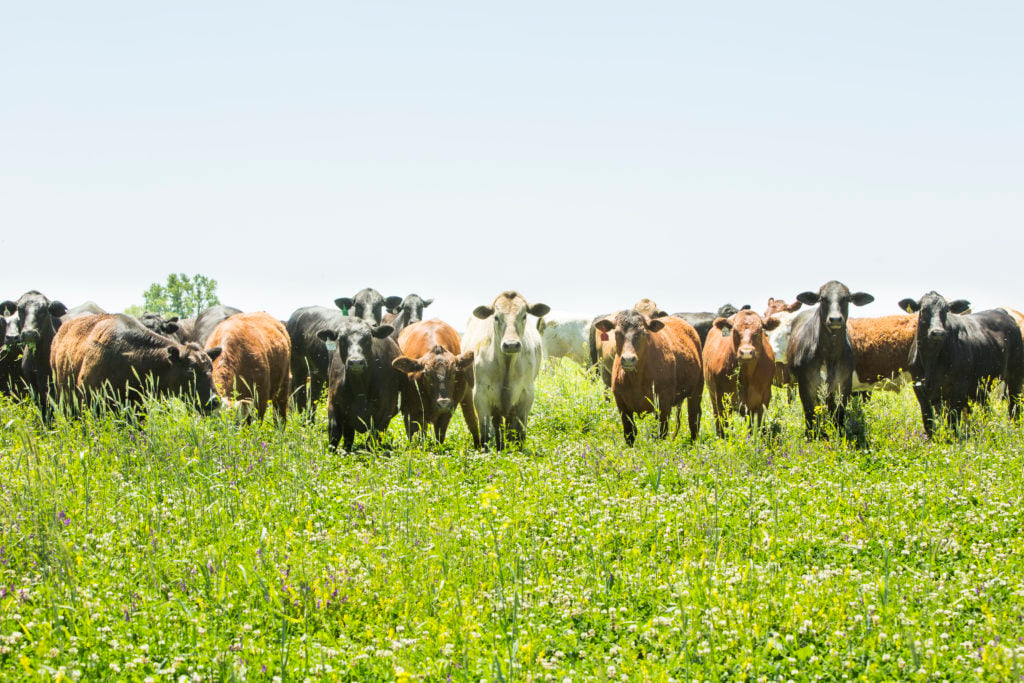
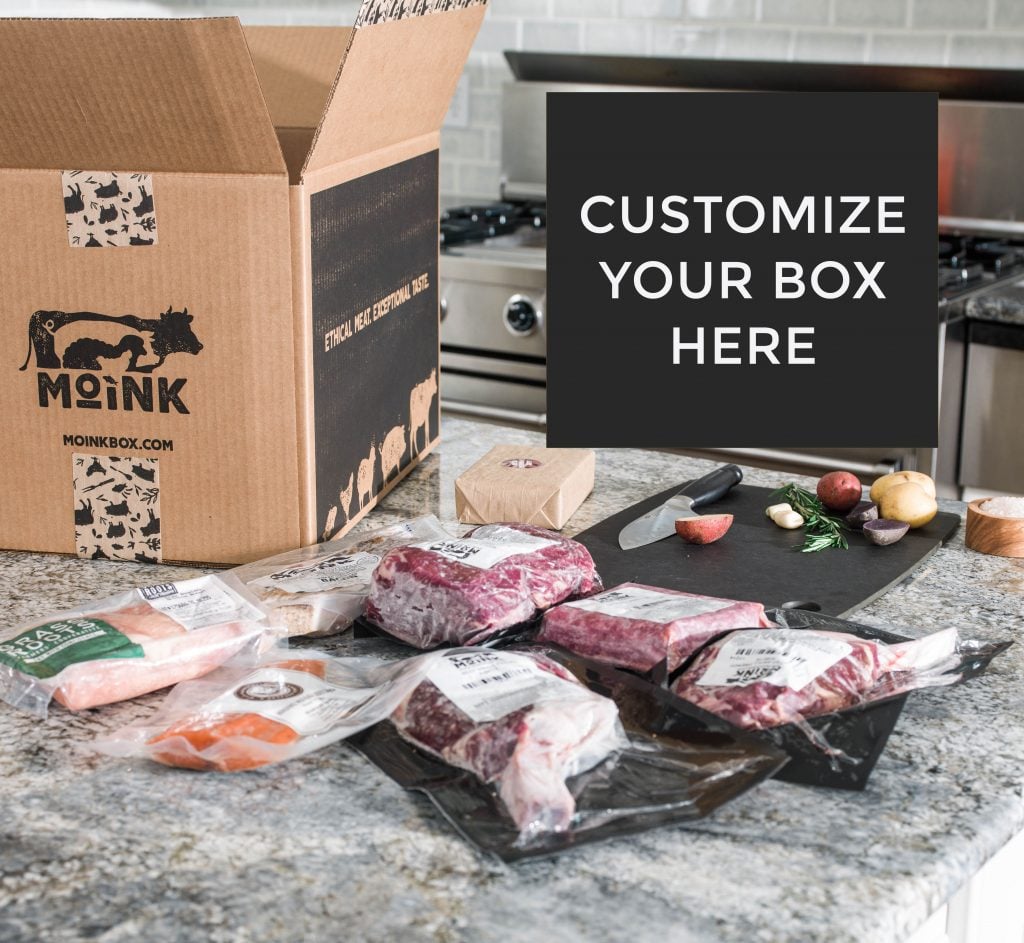
Where’s the lamb?
We’re low on lamb right now, but it’ll be back on the menu shortly!
We can’t wait to try your meats, chicken and salmon!
Looking forward to trying ur beef
can I order a tenderloin and bacon and rack of lamb..do you price it per lb or how can we work
The meat weprofd get from you all is the best meat around. We especially love your beef (steaks are awesome)! It feels good to know and trust that you care about raising and sharing healthy animals and producing real meats without the garbage added. Thank you for that. Thank you and all of your workers for being great farmers and good people.
Thank you
How long do you age your beef?
Our beef is aged for 30 days.
Everything posted about MSG on here is either a straight up lie or or misinterpreted data. This unfounded fearmongering over MSG show be removed from this website. While I definitely support your overarching goal, this bit of fearmongering about MSG has really turned me off from this company. It makes you website seem like all those other sites that tell you.
I can not possibly eat that much food each month, only two in our family. Can I order say 4 times year or smaller amounts? Plus what country are you in and source your food from?
Yes, you can set whatever schedule you like, up to every 8 weeks, and skip boxes if you don’t need a delivery. We’re in the USA, and all our food is from American farms.